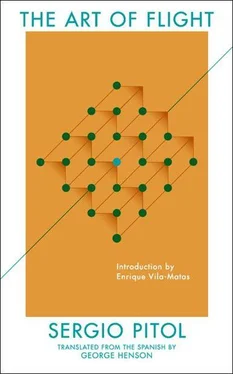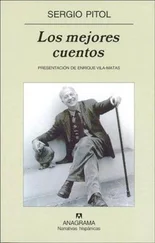“We crossed Funchal until we arrived at a mansion on the outskirts that had seen better times, on whose terrace lay in deck chairs two youths covered in bandages and in casts from head to toe, taking air; both were convalescing from an accident. They lived there with their parents, a sister, and an English nurse who attended them. They belonged to an old family from my country, yes, the best kind of people, with large sums of money deposited in banks in different countries, although to see them no one would have thought as much; it was a house with little furniture, frighteningly ugly; the garden had become overgrown and where it was not overrun by weeds there were huge holes, like volcano craters.”
The dinner guests’ attention began to wane. Upon noticing signs of retreat, the old woman raised her voice even more and cast disapproving glances at the deserters, but she was defeated; conversations in small groups or pairs had already spread. Determined, she addressed the writer exclusively, hinting that he should consider it a privilege to hear such intimacies and memories of a place she considered off-limits to strangers.
“I approached the lounge chairs where the young men were lying” she continued, “and one of them, Arthur, quickly raised his partially plastered arm with his free hand, grabbed my big porcelain brick-colored buckle and pulled me to him, moaning and gasping; the pain from the effort must have been tremendous. ‘A sudden outburst of amorous passion,’ my mother, who was very wise, commented later. It may have been, but I think the poor, ailing creature was glad to see an impeccably dressed young woman, wrapped in beautifully colored fabrics, since he was always looking at his mother and sister — the nurse does not count — who were dressed like prisoners, which, I can assure you, was almost a crime in Funchal, whose elegance rivaled that of Estoril itself. Ah, such wonderful salons, and terraces, and garden parties! My greatest amusement at soirées was guessing the designers. Who had dressed the Princess Ratibor? Schiaparelli! And General Sikorski’s niece? Grès! She was transformed into a Greek sculpture. And the very rich Mrs. Sasseson? None other than Lelong! Yes, Sir, Lucien Lelong himself! My mother and I devoted our time at those parties to detecting which was an authentic Balmain, Patou, or Lanvin, and which were copies made by the Island’s prodigious seamstresses. Those were moments of splendor. One needed the Gotha within reach to avoid taking risks; one could be ruined at every step with the central European and Balkan titles. Of Arthur’s many wounds the only truly serious one was his knee, which had been shattered in a dynamite explosion. That is why the poor fellow still walks with a limp and not because of sciatica as he would have people believe, much less the bouts of gout as the Finnish doctor has been spreading. Yes, Arthur fell in love with my buckle; he loved the color, and asked me to wear it with all of my dresses. It may seem rather immodest on my part, but the belt buckle made him walk again; he began to stand; of course, he fell almost every time, howling in pain; we yelled to him amid applause that nothing could be learned without suffering. Now look at him, he’s like a colt! Were it not for me, he might well be prostrate in his deck chair.”
At that moment someone interrupted the storyteller, and the novelist took the opportunity to meet the woman who was eating silently to his left. She smiled at him widely and repeated the same words she had said at the beginning of the dinner, which is to say she pointed to her plate and said in broken English, “Is good.” It pleased him enormously that a mere two words could make up a conversation because he was deaf in his left ear, and conversations on that side were almost always torture for him; misunderstandings often occurred, his responses seldom coincided with people’s questions; in short, it was a nightmare.
The admirer of Madeira once again demanded his attention, and he, to extricate the monologue from the exhausting world of fashion, asked if the two young men had been injured in military action. The woman looked at him sternly and haughtily, and finally answered that the Finnish doctor, not the current but the previous one, had spread a malicious rumor that Arthur and his brothers had exploded the dynamite in order to avoid their military obligation, which was both slanderous and preposterous; none of them feared recruitment for the simple reason that their country was neutral. They had transported the dynamite in a small boat in order to eliminate an islet that was obstructing the view from the house. The oldest brother died, the other was paralyzed for life, and Arthur, the youngest, barely survived. He dreamt of devoting himself to organizing and directing safaris in Central Africa. When he recovered, contrary to what everyone might expect, he devoted himself to studying, and later joined the Foreign Service.
They were now having dessert; the woman from Albania touched his arm slightly, pointed to her plate and said, “Is good,” and then, expounding for the first time that night, added, “Is very many pigs,” or something that sounded close, and began to laugh delightfully. The wife of the Nordic ambassador appeared insulted. Not wanting to lose her preeminence, she made a comment about desserts in Madeira, especially those at the Reid and the Savoy, but the writer, infected by the gratuitousness of the Albanian woman’s humor, suddenly interrupted the ambassador’s wife with a comment about Conrad, his travels and his layovers, and said that he would have liked to know what he said when talking to ladies in Southeast Asia.
“Who?”
“Joseph Conrad. I imagine he must have occasionally received invitations; that he must not have spent all his life talking to merchants and sailors, and that he also spoke to wives, daughters, the sisters of British officials, of shipping agents. What do you think he talked to them about?”
The woman must have thought his deafness had caused him to become lost, and that it was necessary to assist him:
“The Portuguese women dressed with impeccable taste, some in Balenciaga, but their conversation did not always match the hauteur of their attire; they always seemed uninteresting to me, not to mention they were also incredibly stingy. They demanded prompt and impeccable work, but for payment they were a calamity. Well, all of them, not just the Portuguese, were dreadfully tightfisted,” she exclaimed with sudden bitterness. “The war was a pretext to exercise their greed. They wanted to be queens, and they almost were: princesses, countesses, wives of bankers, in exile, yes, but with their fortunes safe, all of them, without exception, were unable to appreciate the work that conferred their elegance. They were willing to waste an entire morning in order to begrudge a dressmaker the few escudos needed to survive. Yes, Mr. Ambassador, I shall not take it back: they were all dreadfully tightfisted.”
The hosts stood; the twenty-two guests followed suit, and they all moved slowly toward the salon to take coffee and liqueurs and smoke at their leisure. The writer approached, not without a certain morbid curiosity, the husband of the woman to whom he had listened throughout dinner, an elderly man who looked as if he were made of knots arranged haphazardly on bones, a face composed of arbitrarily positioned pits and protrusions, a porcelain prosthetic eye capable of disturbing even the most phlegmatic interlocutor, and a leg that lacked movement. He spoke as intensely as his wife in the presence of two functionaries from the Portuguese embassy who listened to him dispassionately about the preparations for the upcoming wild boar hunt in the Tatras, which only six or seven very skilled hunters would attend. The writer realized for the first time that he was looking at him with his prosthetic eye, which he always had covered with a black patch. The writer was surprised that the old codger, one-eyed and quasi-paralytic, was awaiting the event with such strange enthusiasm. As soon as he was able, the writer interrupted to say that he had just spent the holiday in Madeira and that he had taken advantage of the time to relax and read. He did not dare add “to write” because the porcelain gaze from the fake eye and the glimmer of confusion that emerged from the real one transformed instantly into a dark horror that bordered almost on dementia. The embassy staff took advantage of the moment to slip away and attend to another solitary guest.
Читать дальше












